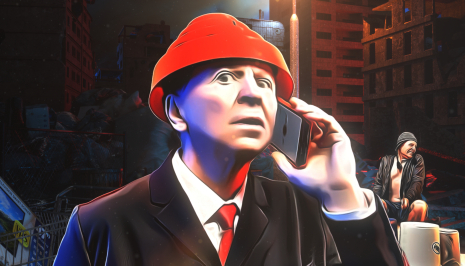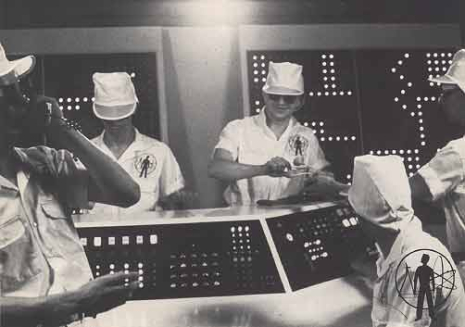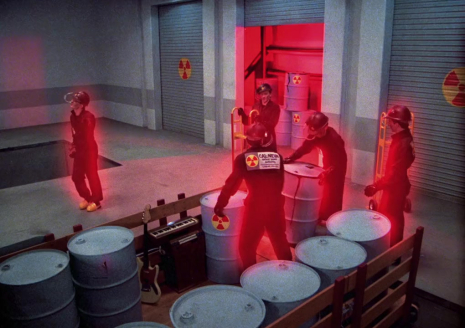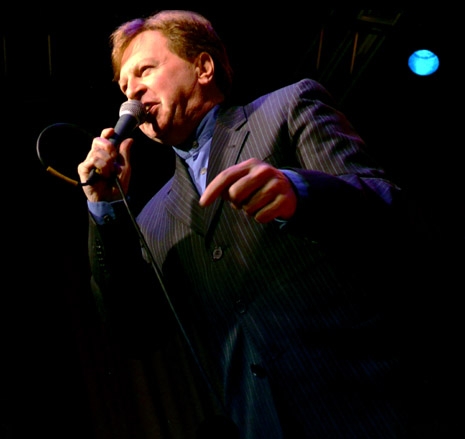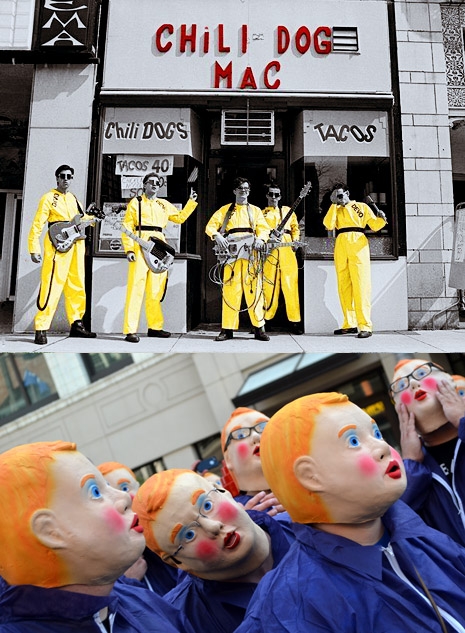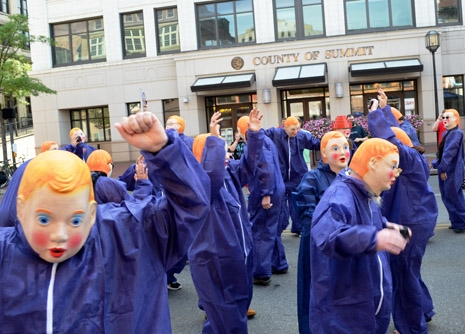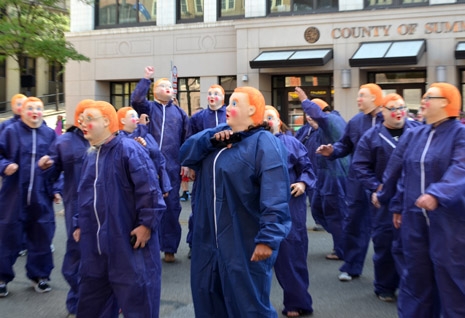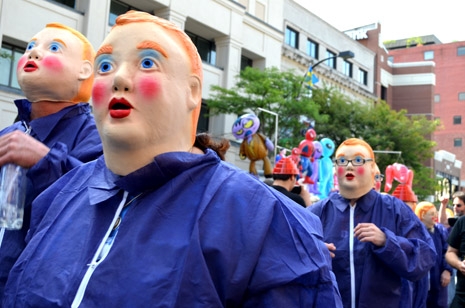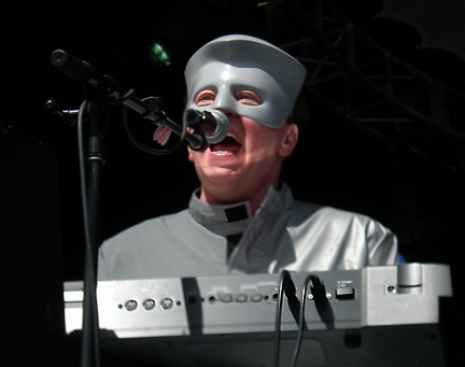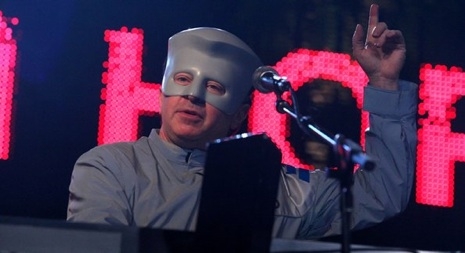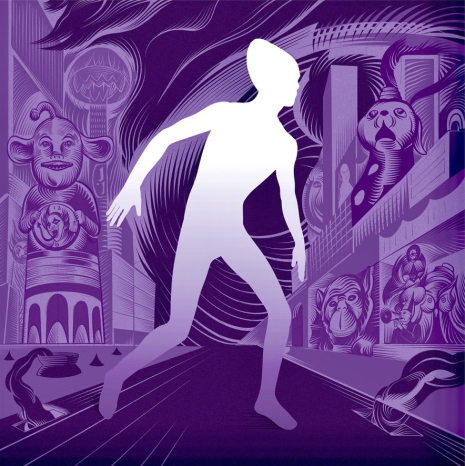
Illustration from ‘The Invisible Man’ by TOMO77
The poster that came with DEVO’s 1981 New Traditionalists album depicts the band sheltering an ethnically diverse triad of babies from the worst elements in American society: a horde of pirates, pushers, concert promoters, and Puritans looking to instrumentalize these newborns for their own unspeakable ends. Arrayed against this mob in matching JFK pompadours and Nutra work outfits, the men of DEVO face the challenge with poise and sangfroid, ready to open a cold can of whup-ass on these would-be baby-wreckers.
In the background, the uncredited artist represents the USA as a rolling lawn ornamented with a few topiary trees, their branches shaped into stacked orbs that taper like the steps of the DEVO energy dome, three leafy cocktail onions of descending size impaled on toothpicks stuck in the horizon. This is the landscape on which DEVO’s Gerald V. Casale stretches his legs in the music video for his latest solo release, “The Invisible Man.”
Once again, it’s “morning in America,” except for the glans-pated dweeb who dogs Jerry’s steps on the yellow brick road, subjecting him to sexual harassment, humiliation, and abuse. But as the story plays out, Jerry begins to suspect—his opponent’s neck tattoo of the D.R.I. logo notwithstanding—he’s once again doing battle with The Mark Inside, old Number One from The Prisoner.
Dangerous Minds caught up with Jerry by 21st-century videophone on November 22, 2022.
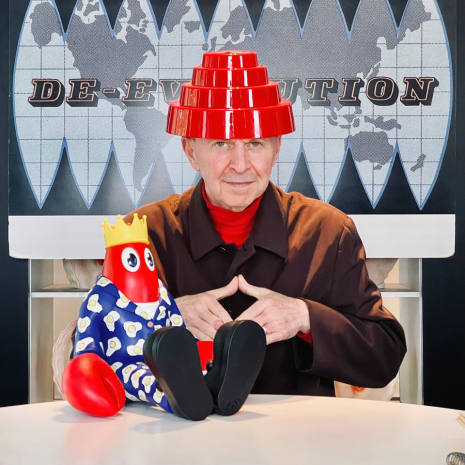
Before I ask you about “The Invisible Man,” it’s November 22. I’ve read a lot of DEVO interviews and I don’t know if you’ve spoken about this very much, so I thought it would be interesting to ask what you remember about the Kennedy assassination, and how you think that event affected your young minds.
Yeah! Probably, that was like the opening salvo in a barrage of timed traumas that just continued the next seven years, that pretty much twisted up everything in my life and set me on a fork in the road, kind of like the proverbial red pill in The Matrix.
I remember everything. I was in French class in my high school. We had a particularly sexy French teacher who was a graduate student, so she was probably, I don’t know, six or seven years older than us, and wore more trendy clothing, like herringbone-print skirts that were above the knee, and black boots, and little blouses that got the boys going. Anyway, suddenly the principal walked in, middle of class, and said, “Class, I have to tell you that the president of the United States has been killed today.” And [laughs] you know, you’re just, like, almost unable to process what you’re hearing, like it’s kind of real, but not really real? And then some of the girls start bursting out crying, and he goes, “And as a result of that, we decided to suspend all classes for the day and send you home.”
And it was interesting, ‘cause [laughs] a girl that I was really interested in, in this kind of puppy way where I didn’t even understand what I was doing, she was crying, and something in me, despite the fact that I was really freaked by what I’d just heard, and kind of understood how serious that was, or how frightening that was, to the United States, I of course used it to offer to walk her home [laughs]. So, you know, the little budding man in me started taking over, and I felt all, like, you know, it was a real, I don’t know, what was it, Stand By Me moment, like these coming-of-age comedies. And I walked her home, and I had my arm around her, and had her holding my hand, and I felt so, like, brave and excited, and scared at the same time.
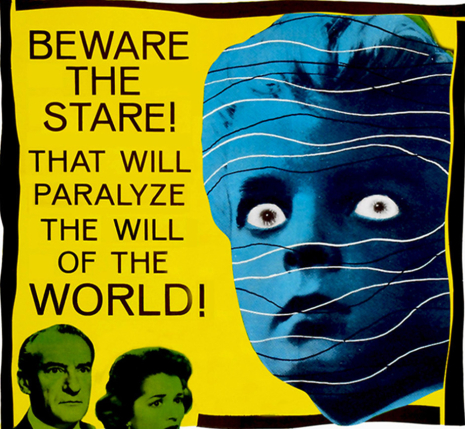
Detail from the ‘Village of the Damned’ poster
And then I didn’t go home right away. I thought I’m not going home, I’m not going home to my parents, ‘cause I was already at odds with them. ‘Cause they were blue collar and authoritarian, they didn’t understand me, they were policing my reading list and always criticizing me, and I felt like they didn’t understand how smart I was. So I decided to freak them out by just doing something I never did, which is I walked downtown and I went to the movie theater. I forget what was playing now; it was a black-and-white film, of course. It might have been Village of the Damned, English, great film.
And then, you know, when I got out of the theater it was already dark, ‘cause it was November in Ohio and it got dark at like five o’clock. And the moment I walked home, of course, I got attacked and talked to and screamed at. But then the television was on, and it was wall-to-wall coverage of the assassination. And, believe it or not, and I don’t know if other people have told you this, but you know the famous Zapruder film, where this guy was shooting, innocently, the arrival of the president in Dallas in his motorcade with a Super 8 camera, and it became the primary evidence of what the Warren Commission kind of bastardized. We saw it unedited, played over and over on TV. There were only three channels, they were all national, so the news—there was real news then, guys like Walter Cronkite just presenting things—would show it. I guess the country wasn’t centralized enough into some kind of CIA disinformation clampdown where you could see the impact, over and over and over! You could see the shots and her crawling on the trunk, Jackie Kennedy. You’d never see the Zapruder film that way again, because once the Warren Commission got ahold of it, they edited it, and what you saw afterwards in history, after that weekend, is never really the film.
And Ι saw the assassination then on Sunday, you know, we were Catholics and forced to go to church, so Sunday morning, television’s on, we’re watching [them] taking Lee Harvey Oswald from the Dallas police station to his court hearing, and we saw live the assassination of Jack Ruby killing Lee Harvey Oswald, right there, with my parents [laughs] while we’re waiting to go to church! I was fifteen.
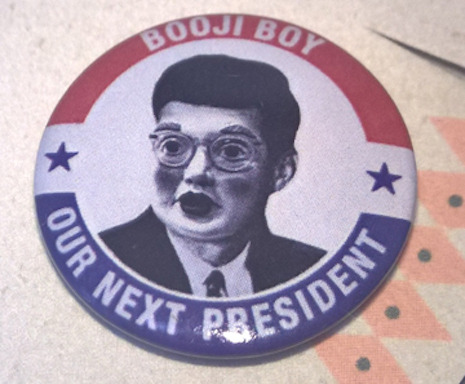
So it sorta blew a hole in everything, it sounds like.
Yeah! And then soon on the heels of that came the assassination of Martin Luther King, the assassination of Bobby Kennedy, the assassination of Malcolm X, as I was coming of age and reading and getting politicized and protesting against the Vietnam War. And it just all jelled. And it ended then with, you know, the National Guard killing four students and wounding nine on May 4, 1970, right in front of me.
There’s a kind of a straight line between those events, for you? Do you see it that way?
Yeah, it’s pretty much a three-stage rocket [laughs] right to supreme rage. Where you consciously put it all together, and you make a decision, and you’re on a path that sets you against all illegitimate authority forever. You’re a “difficult person,” resistive to authority. And that’s really what made me who I was, and really, I don’t think without it DEVO would exist.
I’m a big fan of the EZ listening stuff. There’s some EZ listening stuff on the new EP—
With vocals! With vocals, for the first time.
It reminds me a little bit of the Last Poets.
[Laughs] Well, I am one of the last poets now.
You are, Jerry. But as I look back at that stuff now, I wonder if there was a kind of idealism—there seems to be a real nostalgia underneath, maybe, for that New Frontier, early Sixties…
Yeah. And that’s understandable; we were fed a big heap of fantasy. And it was presented using science. When they showed you the future, it was based on innovation and technology and science. So the flying cars, the domed cities, the end of labor, it was a pretty fine middle-class fantasy of leisure and prosperity! It was a complete brainwash job.
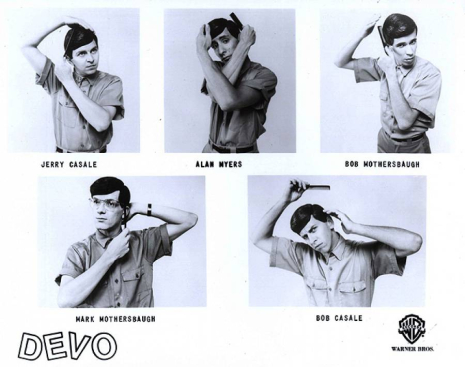
Promotional photo from 1981 by Robert Matheu (via Club DEVO)
I keep waiting for that World’s Fair vision to materialize myself.
Yeah, well, forget it.
Read more after the jump…






